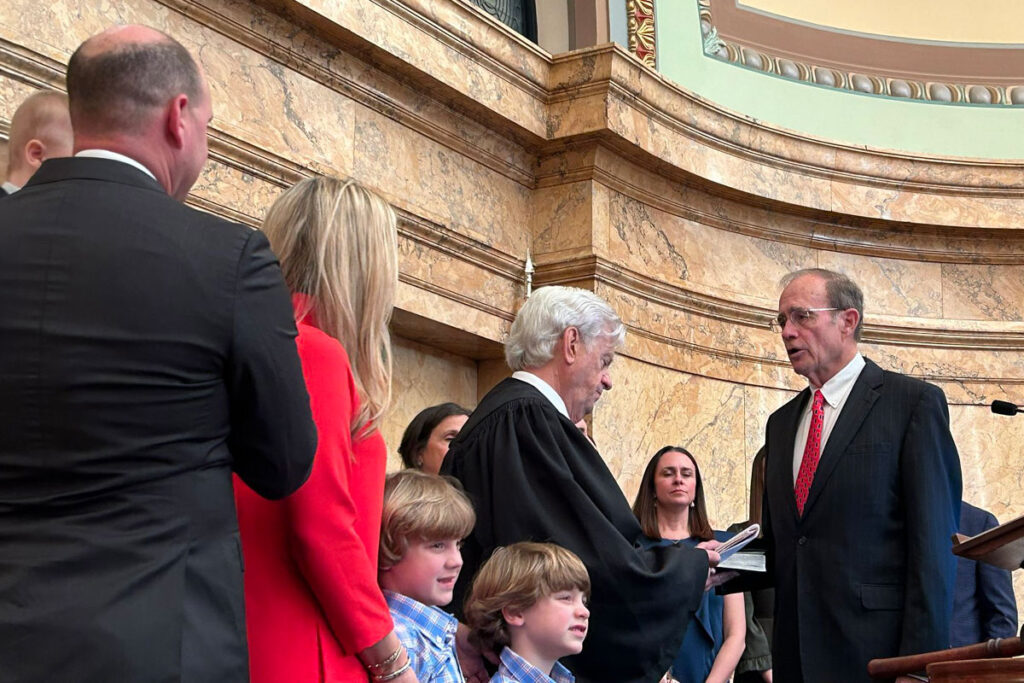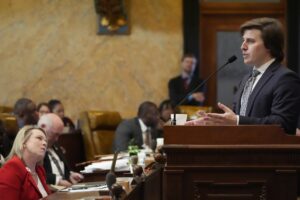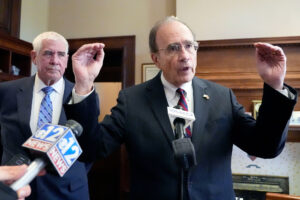Education reforms could be coming to the Magnolia State as the new House speaker, Republican Jason White, vows to expand “school-choice” programs and reform existing public-school funding.
But the Senate president, Republican Lt. Governor Delbert Hoseman, is continuing to encourage lawmakers to prioritize public education funding for pre-K through higher education.
Reforming Education Funding
During a joint session of the Mississippi Legislature on Jan. 4, Lt. Gov. Hosemann briefly explained his proposed “Last Dollar Tuition” program, which would provide free tuition for community college students who meet certain grade-point averages and other requirements.
“Each person must have the education they need to obtain a positive economic future,” Hoseman told his colleagues. “This education must demand quality and achievement from those who provide it. It has to be adequately funded from pre-K through the highest level that our citizens need.”
Speaker White outlined his thoughts on education during his own speech to the House on Jan. 2, saying that he would ask the House to consider legislation to reform both the State’s public school funding formula and Mississippi’s K-12 accountability model.
“The formula should reflect the priorities of this body, the actual dollar spent, and the duty we have as a state to provide her people with the chance and a first-class quality education,” White said during his first speech as House Speaker. “The Accountability Model should also reflect those same objectives, while college preparedness will remain a priority.”
The Legislature established the State’s public-school funding formula, the Mississippi Adequate Education Program, in 1997. The formula calculates the amount needed to provide adequate operating funding to meet the accountability scale of “Successful” or a “C” rating by the Mississippi Department of Education. It is recalculated every four years to account for inflation. Conversations around MAEP funding have long dogged legislative sessions. The Legislature has only fully funded the program twice since its creation, most recently in 2008.
Under the MAEP, local districts must contribute the equivalent of $28 for every $1,000 in assessed property value toward their annual education budget. But state law guarantees that no district will pay more than 27% of the program cost, often referred to as the 27% rule. The stipulation benefits districts with more property wealth by allowing them to tax themselves at a lower rate. White said the provision needs closer examination.
“We will look closely at the so-called 27% rule,” White said. “Who are the winners? Who are the losers? What could be done differently and more importantly, done better?”
Parents’ Campaign Executive Director Nancy Loome said that fully funding education is important to maintaining the educational strides the state has made. Mississippi has been nationally recognized for its work in improving literacy rates in elementary-school students. Loome said that as COVID relief funds run out, it becomes more difficult for districts to keep doing the things that made them successful.
“A lot of those programs that have been so important in moving the needle on proficiency will go away if the legislature doesn’t step in and provide some additional funding,” Loome told Mississippi Free Press on Jan. 4. “They can do that simply by fully funding their obligation in law to our schools. This year, we’re underfunded by $176 million. That counts the extra 100 million that the legislature sent public schools last year that was outside of the formula. Legislators could help a lot—make sure that we don’t go backward.”
The Parents’ Campaign is urging lawmakers to deliver a plan to reach full funding no later than the 2025-2026 school year and to provide other education funding including full funding of the MAEP special education add-on, expanding literacy efforts, and maintaining the current level of funding for literacy and math coaches.
“We’ve run the numbers on this,” Loome said. “If they fully funded the MAEP, our per-student expenditure as a state, or the total funding going into school districts, would still be less than our neighboring states. So anybody who alleges that MAEP asks for too much (should know) that it is still less than what the districts in other neighboring states are getting.”
During his remarks earlier this month, White also seemed to express support for state superintendent of Education nominee Dr. Lance Evans, saying that the Legislature will seek his input in their decision-making.
“I’m very excited about his new leadership at MDE and the possibilities for the future of our children in this state,” White said on Jan. 2, referring to Evans.
The Senate rejected the nomination of Dr. Robert Taylor, who would have been the state’s first Black state superintendent since 2005, last year amid accusations from white lawmakers that he was a “woke Democrat”—even though his nomination was the result of a nonpartisan search.
‘We Must Fully Fund Our Public Schools’
The Parents’ Campaign is also asking lawmakers to codify plans to mitigate the state teacher shortage. Director Nancy Loome said that as Mississippi passed its historic teacher pay raise legislation last session, neighboring states were passing similar bills.
“We have to pay attention to what our neighboring states are paying,” she said. “That’s very, very important for school districts on the border of the state line because those teachers can drive 10 minutes and be in another state making a lot more money. We have to keep up not only with other states but also with other professions within our own state.”
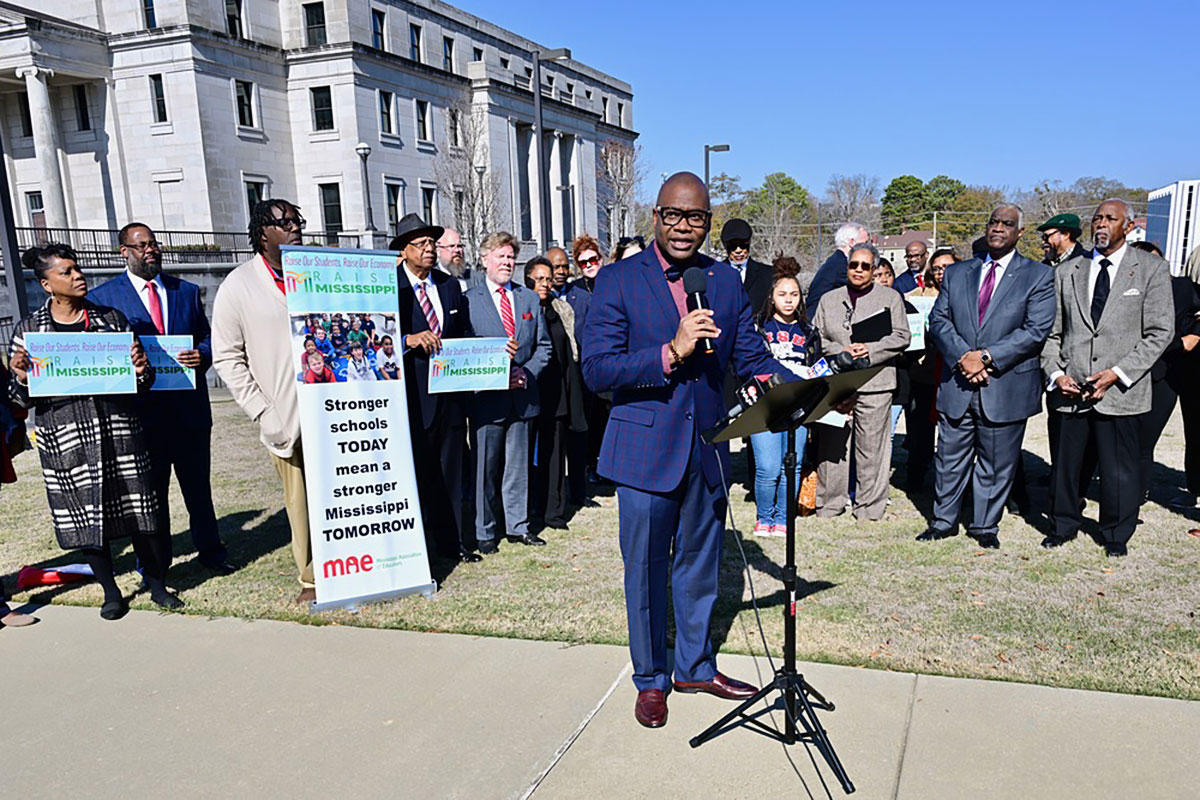
Days after White’s inaugural address to the House, the state’s largest teacher organization reiterated its support for education funding. The Mississippi Association of Educators and various support groups held a press conference on Jan. 4 emphasizing its Raise Mississippi Initiative, which launched in August. The initiative brings educators, students, parents, business leaders, community leaders and elected officials together to develop a plan to fully fund education. Raise Mississippi’s focus is on ensuring that all public schools have appropriate teachers and support staff, nutritious meals, up-to-date technology, and safe and orderly schools.
“There are over 457,000 students in the State of Mississippi,” Businessman Leroy Walker told those gathered outside for the press conference. “Our shortfall is roughly $5,000 per child. We’re asking the State of Mississippi to please review that PEER report and see whether or not those facts are credible and authentic—and make absolutely sure that we try to put a measure in place that will address that particular shortfall for our students.”
During last year’s session, the House voted against a modified, but fully funded version of the MAEP passed in the Senate with then-House Education Chairman Rep. Richard Bennett, R-Long Beach, referring to the formula as a “black hole.” House leaders refused to allocate the proposed $181 million more per year, saying they wanted funds to be earmarked for specific programs. Mississippi legislators finally settled on a $100 million increase in funding with the stipulation that it could not be used on administrator salaries.
“I believe the formula is faulty. I think it’s outdated. I think it needs to be reworked,” former House Speaker Phillip Gunn told reporters during the January 2023 session. “In fact, we passed the bill five or six years ago to change the formula out of the House of Representatives. So we are not fine with the idea of putting more money in MAEP, but we’re certainly not opposed to spending more money on education.”
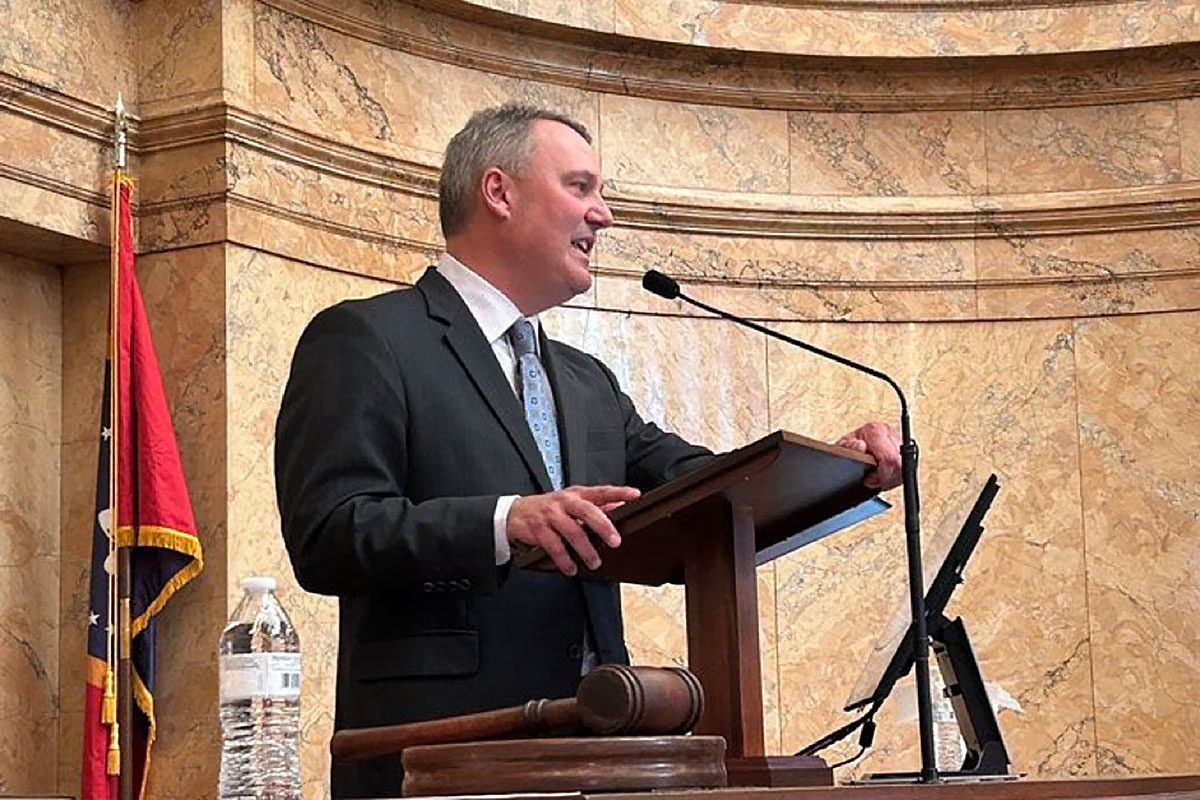
Sen. Derrick Simmons, D-Greenville, addressed the body’s failure to allocate the necessary funds for education last session and expressed his support for fully funding education during the MAE press conference Thursday.
“If you want to truly raise Mississippi, we must fully fund our public schools,” Simmons told those gathered. “Our K-12 schools saw an increase in funding of about $100 million last legislative session, but our K-12 schools are still underfunded by a total of $3 billion since 2008. Our schools, our students—they need and deserve full funding.”
Another ‘School Choice’ Push
Speaker White’s Jan. 2 remarks also indicated that “school choice” will be discussed during this year’s session. He encouraged rewarding districts that bolster career and technical education programs and trusting parents with decisions about their children’s education.
“I will also ask this body to consider legislation that will give our parents not only the ability to choose this alternative high school curriculum track for their children, but also (give) our parents, most of whom are Mississippi taxpayers I would remind you, the ability to choose an educational structure tailored to their child’s needs,” White said. “Especially in our underperforming districts and in districts that do not offer these alternative career tech tracks that we intend to be available throughout the state.” It is not yet clear exactly which “school choice” legislation the new speaker will pursue this year.
Over the last decade, the Legislature has repeatedly enacted “school choice” legislation, including bringing charter schools to the state and enacting a limited voucher program that pays for some special needs students to go to private schools—including ones that do not offer special education programs. Efforts to further expand voucher programs more broadly in recent years have failed.
The fight over vouchers stretches back decades to the period after racial desegregation when state lawmakers began pushing vouchers as a way for white families to send their children to all-white private segregation academies. While private schools can no longer legally discriminate based on race, many of them remain mostly white and receive voucher funding under the current program.
Loome is concerned about the continued push for public dollars to fund private education. She said that the underfunding of MAEP shows that the State does not have the funds for voucher programs.
“If we can’t afford to adequately support those schools where taxpayers know exactly what they’re getting for their money, it makes no sense to be spending state money on schools that operate in private (and) don’t have any accountability to taxpayers,” Loome said. “In fact, if that school-choice legislation were to pass, what we would have would be two separate education systems, both funded by the state—(a) separate but unequal one, with no rules at all. No accountability to taxpayers.”
The Parents’ Campaign is urging legislators to defeat any new voucher programs or tax credit programs and to implement, maintain and strengthen accountability measures for existing programs.
“Any public dollar that we send to a private school, whether it is in a tax credit or whether it is a direct appropriation that goes to a parent to pay tuition or directly to a school, all takes money out of the state budget,” Loome said. “It all has the very same impact on the state budget, which is it diminishes what is available to go to any other state agency, including our public schools
In his remarks, White acknowledged the state’s “complicated history,” encouraging the chamber to envision changes in the future of education in Mississippi.
“As a former Mississippi House member and former Governor, the formidable William Winter said before, I’ll say it again: ‘It’s boat rockin’ time in Mississippi,” he said.
Heather Harrison contributed to this story.
Correction: An earlier version of this story incorrectly named Dr. Robert Taylor as Dr. Henry Taylor due to an error inserted by an editor. We apologize for the error.


